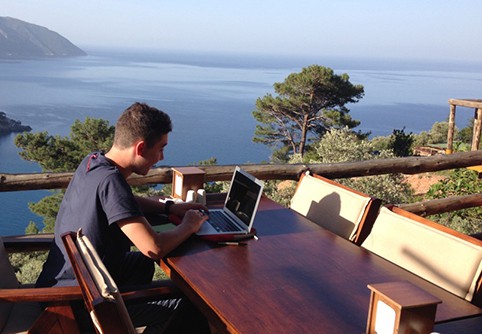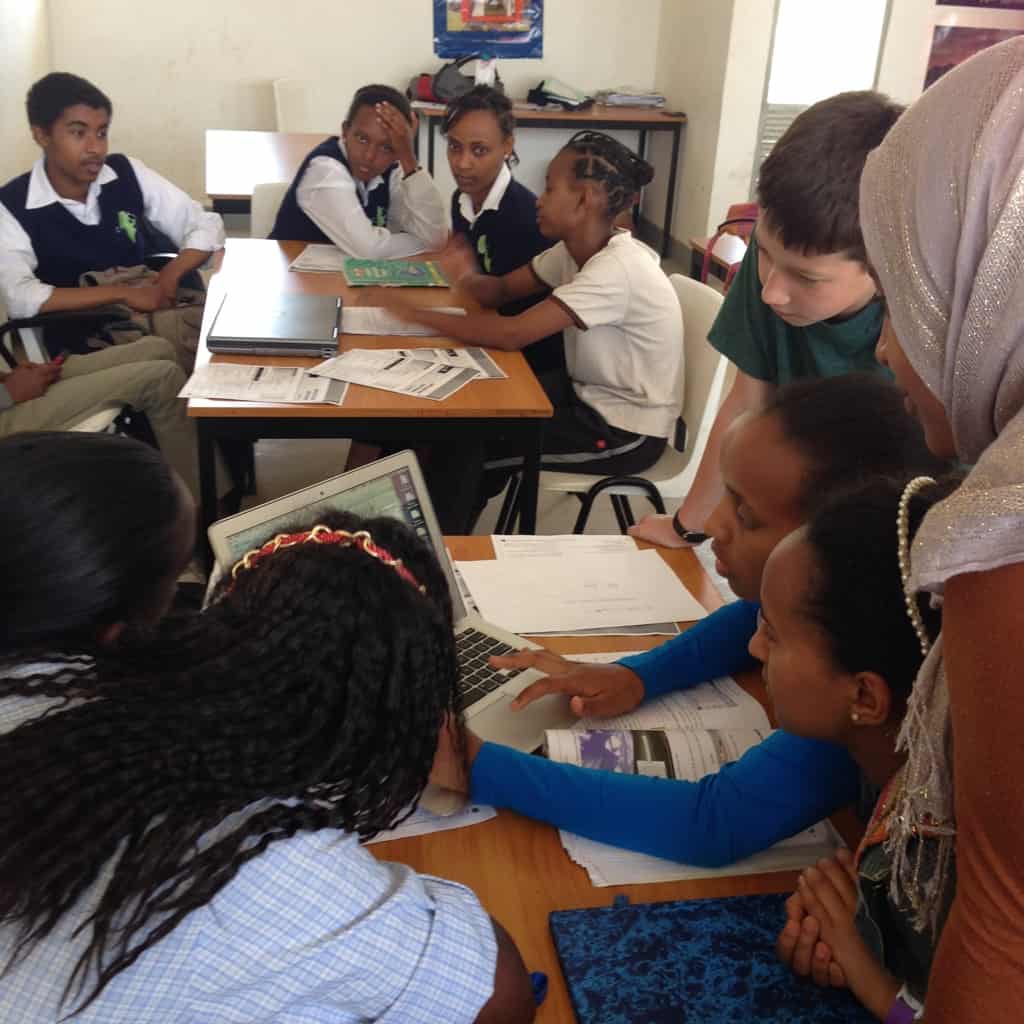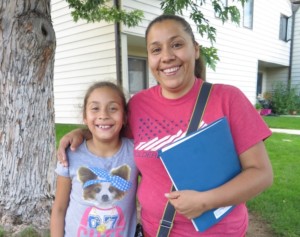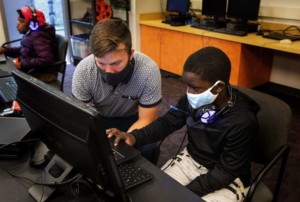One Family’s Journey Exemplifies Anytime-Anywhere Learning

Max Silverman & Sue Wilkes
We are a family of five consisting of two parents and three children; Noah age 14, Caleb age 12, and Rohama age 10. Nearly three years ago, we began dreaming about an extended trip in which we would travel and see the world together. After many months of planning, saving, and preparing, we set off on a six-month journey that includes stays in Ethiopia, Jordan, Israel, Turkey, Spain, Italy, Hungary, Poland, Czech Republic, and the Netherlands.
With our oldest currently a freshman in high school we decided from the outset that it made most sense for our trip to comprise one full semester of school. This would allow him to complete his first semester of high school, miss a semester, and then return to school for the start of his sophomore year.
Oddly enough, this was the extent of our initial thinking about traveling and school. We say oddly enough, because to our surprise as we told others about our trip, the first question we almost always heard was, “What are you going to do about school?” With all of the historically and culturally significant countries on our itinerary, the last thing we were worried about was what we were “going to do about school.” We have had to learn as we go, but in a short time we have witnessed the opportunities, challenges, and surprises that come with learning on the road and in several different countries.
As parents we had good clarity early on regarding what we hoped our kids would learn while traveling. To be honest we were much more focused on how they would develop as young people rather than how they might advance their academic skills. To us this meant:
- They would learn how to handle themselves and problem-solve in environments very different than their own.
- They would develop an empathy and understanding of how others in the world live and sometimes struggle.
- They would be exposed to the incredible cultures and history of countries in Africa, the Middle East, and Europe.
- They would nurture their curiosity and develop a deeper understanding of places and people they had only read about in books or the news.
 As we approach the half waypoint of our trip we are so pleased with all that Noah, Caleb, and Rohama have been learning about the world and themselves. They have each taken on volunteer opportunities in Ethiopia, figured out how to adapt to new and very different situations, and started making interconnections between the different places we have visited and the people we have met.
As we approach the half waypoint of our trip we are so pleased with all that Noah, Caleb, and Rohama have been learning about the world and themselves. They have each taken on volunteer opportunities in Ethiopia, figured out how to adapt to new and very different situations, and started making interconnections between the different places we have visited and the people we have met.
What we did not account for in our planning and find ourselves negotiating on a regular basis is how to handle our kids schooling. By this we mean either earning credits, staying on pace with certain courses, and/or continuing to develop reading, writing, and math proficiency. While we are far from figuring this out, we have learned much about how to do “school” while traveling and not have it get in the way of the learning that we really want to occur.
In essence, each of our kids has a “learning plan” that was developed with input from their teachers, each child, and us.
Noah was most concerned about earning the credits necessary to stay on track and be ready for his sophomore year. For him this meant exploring online options offering credits that would be accepted by the Seattle Public Schools. After researching a few options he decided to enroll in the Federal Way Internet Academy initially taking Physical Science, World History, Geometry, Spanish, and Language Arts.
After meeting with the school counselor and teachers, Caleb decided that it was important to keep up with Algebra I so he could advance to Geometry and continue his first-year Chinese studies. This learning plan needed to be quickly adjusted. While he is easily able to complete the second half of Algebra through Khan Academy, we were unable to find a suitable option for Chinese. On his own, however, Caleb explored Duolingo and decided to take up Turkish as our itinerary included one month in Turkey. While he may not continue learning Turkish after this trip, we feel this will be a valuable experience as he trains his brain to learn and use other languages.
In partnership with her teacher we decided that it was important for Rohama to keep up with math, reading, and writing. The reading and writing have been relatively straightforward. She reads books of her choosing on her Kindle and has decided to focus her writing on keeping a semi-daily journal of her travels. As she finds journal entries she likes we work together to turn them into published pieces on our blog. Math has been a bit more complicated as neither of us are trained math teachers. However, over time we found that a combination of Khan Academy for learning new content, IXL for individual practice, along with parental tutoring using a Singapore math workbook and a set of manipulatives is doing the trick.
We continue to struggle how to negotiate taking full advantage of all that we are seeing while also putting in some school time most days. Blogging has provided a great opportunity to articulate and examine what we are learning while also growing and developing as a writer. Each of our kids has decided that their writing will be focused on publishing blog posts. The combination of writing about something of immediate interest along with writing for an audience has helped them produce their best work, with minimal nagging from us.
While in hindsight, we wish we were more intentional about connecting our travels to their schooling (such as having them read books about the places we are visiting), we are finding that our kids are taking in their travels and their schooling on their terms. As a result we have witnessed them:
- Develop a keen interest in current events and growing ability to connect them with what they are learning.
- sharing their experiences and insights with people we meet along the way – each time sounding more articulate than the last.
- demonstrating increasing resilience and independence at each new destination by mapping and learning about their new neighborhoods and problem-solving travel logistics.
While we are certainly not experts on how to best connect schooling, learning, and traveling, we can offer a few tips for others considering a similar journey based on our experiences and mistakes:
- Decide as a family, in advance of travel, how much time you want to dedicate schooling on the road.
- Set clear expectations with each child on what they need to accomplish.
- Understand as parents that you will probably be more involved in supporting each child with their schooling than you may initially imagine.
- Map out when and where you will have access to technology and the Internet.
- Find ways to connect what your children are experiencing with what they are doing for schooling. This is most easily accomplished through reading and writing about places you are visiting.
- Don’t underestimate how much your children can learn just from the experience of traveling and visiting other countries. Try not to let their schooling get in the way of their learning.
This blog is part of our Smart Parents series in partnership with the Nellie Mae Education Foundation. For more information about the project, see Parents, Tell Your Story: How You Empower Student Learning as well as other blogs:
- Parental Perfection, Reimagined
- Why Mentors Matter
- The Teenage Brain: Scaffolding the Brain for Lifelong Learning
 Max Silverman is an Associate Director at the University of Washington Center for Educational Leadership. Follow Max on Twitter, @maxsilverman. Sue Wilkes provides capacity building support and training for non-profit organizations in the Puget Sound area.
Max Silverman is an Associate Director at the University of Washington Center for Educational Leadership. Follow Max on Twitter, @maxsilverman. Sue Wilkes provides capacity building support and training for non-profit organizations in the Puget Sound area.







Justin Talmadge
This is a very helpful post for those of us who have been considering extended travel experiences with children. Thank you, Max and Sue ( and the kids ) for sharing your insights. Now I'm going to check out your blog!
Richard Alan Nagel
You have it EXACTLY right!
Becky Sherman
Traveling and knowing that your children are learning wonderful life lessons while also trying to keep them on track academically for their return is a challenge for sure. Thank you Sue and Max for sharing your experiences and showing us an example of how it can be done!